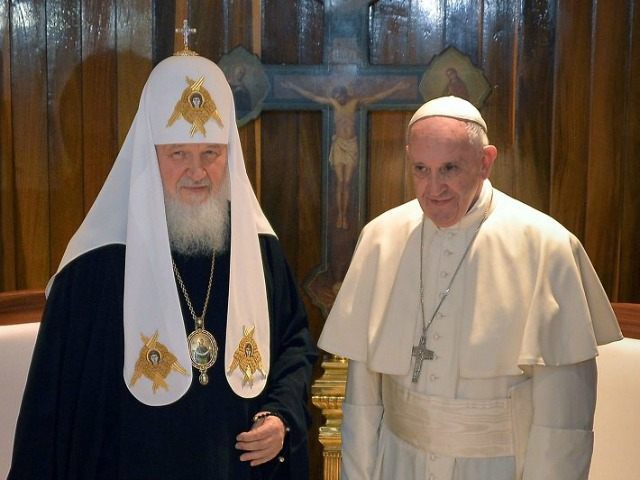In a historic meeting Friday, Pope Francis met with Russian Orthodox Patriarch Kirill at the Havana airport, and the two signed a joint declaration of common belief and purpose, including a vigorous defense of religious liberty, marriage between a man and a woman, and an unborn’s inviolable right to life.
The two men made an impassioned plea for religious freedom in the world, thanking God that the faith can now be lived freely in lands formerly dominated by atheistic communism, but lamenting the many areas where Christians still suffer violent persecution.
“Today, the chains of militant atheism have been broken and in many places Christians can now freely confess their faith,” they said.
“At the same time, we are concerned about the situation in many countries in which Christians are increasingly confronted by restrictions to religious freedom, to the right to witness to one’s convictions and to live in conformity with them,” the declaration reads.
Such religious persecution takes place not only in atheistic nations or those dominated by Islamic or Hindu extremists, but also in areas of the West where the faith is persecuted in the name of enlightened humanism and secularism.
The declaration speaks of “the transformation of some countries into secularized societies, estranged from all reference to God and to His truth.” This often results in a “curtailment of the rights of Christians, if not their outright discrimination, when certain political forces, guided by an often very aggressive secularist ideology, seek to relegate them to the margins of public life,” the text reads.
In a phrase reminiscent of Popes John Paul II and Benedict XVI, the two leaders reaffirmed the need to recognize Europe’s Christian roots, inviting “vigilance against an integration that is devoid of respect for religious identities.” While remaining open to the contribution of other religions to our civilization, they said, “It is our conviction that Europe must remain faithful to its Christian roots.”
“We call upon Christians of Eastern and Western Europe to unite in their shared witness to Christ and the Gospel, so that Europe may preserve its soul, shaped by two thousand years of Christian tradition,” they said.
The joint declaration also makes a forceful appeal for the natural family based on the marriage of one man and one woman, against sociological constructs that threaten the identity of this core institution.
“The family is the natural center of human life and society,” the text reads, and it is “based on marriage, an act of freely given and faithful love between a man and a woman.”
They wrote:
We regret that other forms of cohabitation have been placed on the same level as this union, while the concept, consecrated in the biblical tradition, of paternity and maternity as the distinct vocation of man and woman in marriage is being banished from the public conscience.
Along with a vigorous defense of marriage, the leaders of Eastern and Western Christianity, divided nearly a millennium ago, also made a common plea for respect for human life in all its stages, from conception to natural death.
Repeating a message that Pope Francis made to the United Nations in New York last September, the two leaders “call on all to respect the inalienable right to life,” stating that “millions are denied the very right to be born into the world.”
“The blood of the unborn cries out to God,” they stated.
The two men also decried the application of euthanasia in many parts of the world, which “leads elderly people and the disabled to begin to feel that they are a burden on their families and on society in general.”
A common moral witness on these key issues of modern society is essential for the world of today, the leaders asserted, and also draws the Christian churches closer together.
They said:
In the contemporary world, which is both multiform yet united by a shared destiny, Catholics and Orthodox are called to work together fraternally in proclaiming the Good News of salvation, to testify together to the moral dignity and authentic freedom of the person, “so that the world may believe.”
Follow Thomas D. Williams on Twitter @tdwilliamsrome.
